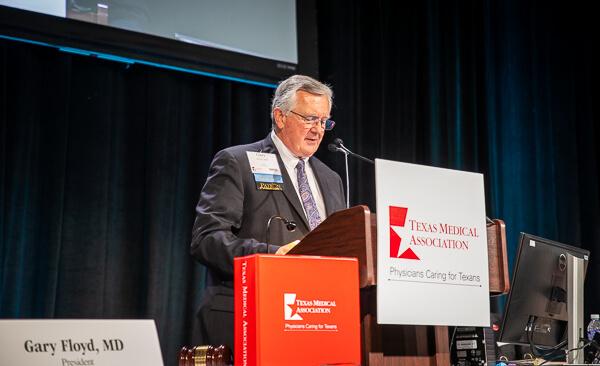
Gary Floyd, MD, a pediatrician and the Texas Medical Association’s 157th president, is well aware of the life changes ahead of him. On May 20, he passed the responsibility of presidency on to Rick Snyder, MD, a Dallas cardiologist, and after nearly 45 years in practice, he says his retirement is on the horizon.
“You could say I’m in transition – like many of you who are starting medical school, or moving from medical school into residency training, or completing residency training and starting practice, or shifting from one type of practice to another, or moving to another city,” Dr. Floyd said in his address to the House of Delegates during its opening session May 19 at TexMed.
The transition has him reflecting on the past, present, and future of medicine. For example, when he entered practice, most physicians were in solo or small group practices, or on faculty at academic centers. Much has changed since then, inspiring TMA’s commitment to serve all physicians in all practice settings and all career stages. But what hasn’t changed is the task before physicians: to take care of patients, one at a time.
The burden now, Dr. Floyd said, is not the profession itself but the landscape around it.
“What has changed, though, and what we all have to navigate monthly, yearly, and over the decades, is the regulatory environment, the policies, the edicts, the Medicare and Medicaid manuals, the ever-changing coding requirements, the legislation, the EMRs (electronic medical records), the checklists, and the costs,” he said.
But medicine and TMA can live, and have lived, through these obstacles, he noted. Prior to 2003, Texas’ regulatory environment was hostile to medicine, with no caps to reduce the number and severity of medical liability lawsuits, even frivolous ones. Specialty care was particularly impacted, with physicians leaving or avoiding the state because of the cost of liability insurance and fear of career-ending lawsuits.
“You can probably remember, if you were there then, some of our patients had to travel two, three hundred miles, just to deliver a baby, or see a specialist,” Dr. Floyd said.
But thanks to concerted advocacy efforts by medicine, he says, fairer justices were elected to the Texas Supreme Court, and a constitutional amendment was passed to reform medical liability costs. Since then, the number of newly licensed physicians in Texas has more than tripled.
Federally, Dr. Floyd recounted the brutal Medicare payment cuts given to physicians under the old sustainable growth rate (SGR) formula for determining Medicare spending. Under the SGR formula, physicians saw Medicare pay cuts of 4.4% in 2003, ballooning up to 10% in 2008 and a staggering 24% in 2014. To dodge the disastrous results of such cuts, Congress continually patched each one, to the tune of $153.7 billion each time.
It was in fact a Texas physician and TMA member, U.S. Rep. Michael Burgess, MD, an obstetrician-gynecologist from Lewisville, who brought an end to the policy.
“He really staked his congressional career on eliminating the SGR. Then he authored MACRA (Medicare Access and CHIP Reauthorization Act), which replaced the SGR in 2015,” Dr. Floyd said – though he added that MACRA has brought its own burden, “and we’ll fight that, too.”
And as recently as this year’s legislative session, TMA continued to succeed in fighting for physicians. Grassroots physician advocacy and the association’s lobby team stopped all advanced practice registered nurse scope-expansion bills in committee.
“There’s a whole lot more happening each and every year at our state Capitol, as well as in [Washington,] D.C.,” Dr. Floyd said.
These include gold-card legislation cleanup at the state level, as well as TMA’s four federal lawsuits concerning the No Surprises Act – the first two of which the association has won. But medicine’s battles continue in many ways and on many fields.
“We as physicians are associated with a health care system that is challenging at best, and some would say is failing. We’re under attack.” Dr. Floyd said. “We still need to speak with one united voice [to] our legislators as we navigate these changing environments; they’re coming fast and furious.”
Even on an individual level, physicians are responsible for – and able to achieve – remarkable change. After a TMA action alert elicited 350 physician messages to the legislature, the bill in question was killed on the House floor, something Dr. Floyd says is notably hard to do.
“[Lawmakers] said, ‘There’s a message TMA has delivered, and we hear you,’” he said. “We need to continue to deliver that message.”